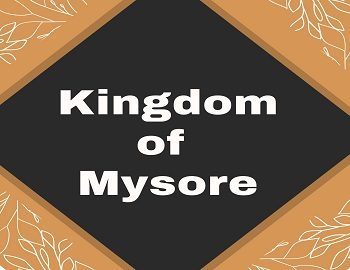Table of Contents
Kingdom of Mysore:
- Situated at the junction of the Eastern and Western Ghats Mysore was ruled by the Wodeyars, but between 1731 and 1734, two brothers, Devaraja (dalwai or commander-in-chief) and Nanjaraj (sarvadhikari or controller of revenue and finance) usurped power in the Mysore state.
Haider Ali (1760-82):
- Haider Ali, born in 1721 in an obscure family, started his career as a petty officer in the Mysore Army.
- Though uneducated he possessed a keen intellect and was a man of great energy and daring and determination.
- He was also a brilliant commander and a shrewd diplomat.
- He rose to prominence with the siege of Devanhalli in 1749 and his return from Hyderbad with huge wealth.
- With that wealth, he augmented his troops and began to train them with the help of the French.
- In 1755, he was appointed as faujdar of Dindigul where he suppressed the Poligars (zamindars) and also established a modern arsenal with the help of French experts.
- In 1761 he overthrow Nanjaraj and established his authority over the Mysore state.
- Between 1764 and 1776, however, he had to fight with the Marathas at frequent intervals and had either to buy them off or to surrender some territories to them.
- After 1776, Haider not only recovered the surrendered territories from the Marathas but also seized all the important places in the Krishna-Tungabhadra Doab.
- He allied with the French and the Nizam and gave a crushing defeat to the English in the First Anglo-Mysore War (1767-69) and forced them to conclude a humiliating treaty in April 1769.
- In the Second Anglo-Mysore War (1780-84) Haider formed a common front with the Nizam and the Marathas against the English. Haider captured Arcot and inflicted a very humiliating defeat on the English in 1782. Haider was suffering from Carbuncle and died on December 7, 1782, at Narasingarayanpet near Chittoor during the course of the war. Tipu continued the Second Anglo-Mysore War against the English till 1784 when both sides got tired and concluded peace by the Treaty of Mangalore (March 1784) on the basis of mutual restitution of conquests.
Tipu Sultan (1782-99):
- Tipu was a man of a complex character.
- His desire to change with time was symbolized in the introduction of a new calendar, a new system of coinage, and new scales of weights and measures.
- He called his government Sarkar-I-Khudadad (A government given by God).
- He also sent his embassy to many countries like Burma, Afghanistan, Iran, Turkey, Egypt, France etc.
- He celebrated the French Revolution, planted a ‘Tree of Liberty‘ at Sringapatam and became a member of Jacobin Club, a famous radical group.
- He abolished the custom of giving jagirs to his officers in lieu of salaries.
- He preferred to give in cash though he gave inam land to temples, mosques and Brahmins.
- He also made an attempt to reduce the hereditary possessions of the poligars.
- Land Revenue- 1/3rd of the gross produce.
- He effort to build a modern navy after 1796.
- He gave money for the construction of the goddess Sarda in the Shringeri Temple in 1791.
The Third Anglo-Mysore War (1790-92):
- Tipu continued his father’s mission of establishing supremacy in Southern India, so he attacked Travancore (1789), which led to the third Mysore War.
- The enemies of Tipu i.e. the English, Marathas and Nizam joined hands together.
- Tipu offered a tough fight but finding it impossible to prolong the struggle, concluded the Treaty of Srirangapatanam (March 1792) which led to the surrender of nearly half of Mysorean territory to the victorious allies.
- Governor-General- Lord Cornwallis.
The Fourth Anglo-Mysore War (1799):
- The immediate reason for the declaration of this war, according to the English, was that Tipu was planning intrigues with the Marathas and the Nizam and sending embassies to Arabia, Zaman Shah of Afghanistan, the French in the Isle of France (Mauritius) and the Directory at Versailles for an offensive and defensive alliance against the British in India.
- Another reason for the war was that Tipu refused to sign a Subsidiary Alliance.
- In this war, Tipu fought gallantly and died while fighting at Srirangapatnam (May 1799).
- Krishnaraja, the descendant of the Wodeyar dynasty, was restored and was compelled to sign Subsidiary Alliance in 1799.
- Governor-General- Lord Wellesley.









Comments (No)